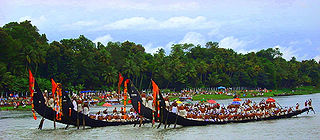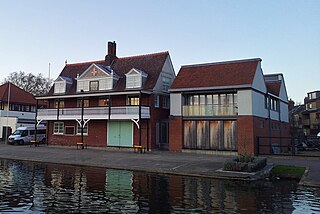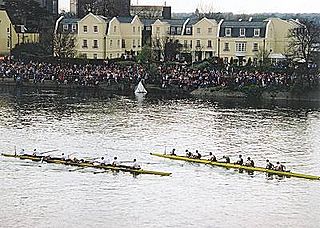Traditional boat race is a Southeast Asian Games sport since the 1993 edition, with an exception in 1999, 2001 and in 2009, the traditional boat race not held.
Traditional boat race is a Southeast Asian Games sport since the 1993 edition, with an exception in 1999, 2001 and in 2009, the traditional boat race not held.
| Rank | Nation | Gold | Silver | Bronze | Total |
|---|---|---|---|---|---|
| 1 | 7 | 3 | 1 | 11 | |
| 2 | 3 | 5 | 2 | 10 | |
| 3 | 1 | 2 | 6 | 9 | |
| 4 | 1 | 1 | 0 | 2 | |
| 5 | 0 | 1 | 1 | 2 | |
| Totals (5 entries) | 12 | 12 | 10 | 34 | |
| Year | Location | Gold | Silver | Bronze |
|---|---|---|---|---|
| 2003 | Hanoi | ? | ||
| 2005 | Manila | |||
| 2007 | Nakhon Ratchasima | |||
| 2009 | Vientiane | Not held | ||
| Year | Location | Gold | Silver | Bronze |
|---|---|---|---|---|
| 2003 | Hanoi | Not held | ||
| 2005 | Manila | |||
| 2007 | Nakhon Ratchasima | Not held | ||
| 2009 | Vientiane | Not held | ||
| Year | Location | Gold | Silver | Bronze |
|---|---|---|---|---|
| 2003 | Hanoi | ? | ? | ? |
| 2005 | Manila | |||
| 2007 | Nakhon Ratchasima | |||
| 2009 | Vientiane | Not held | ||
| Year | Location | Gold | Silver | Bronze |
|---|---|---|---|---|
| 2003 | Hanoi | Not held | ||
| 2005 | Manila | |||
| 2007 | Nakhon Ratchasima | Not held | ||
| 2009 | Vientiane | Not held | ||
| Year | Location | Gold | Silver | Bronze |
|---|---|---|---|---|
| 2003 | Hanoi | ? | ? | |
| 2005 | Manila | |||
| 2007 | Nakhon Ratchasima | |||
| 2009 | Vientiane | Not held | ||
| Year | Location | Gold | Silver | Bronze |
|---|---|---|---|---|
| 2003 | Hanoi | ? | ? | |
| 2005 | Manila | |||
| 2007 | Nakhon Ratchasima | |||
| 2009 | Vientiane | Not held | ||
A dragon boat is a human-powered watercraft originating from the Pearl River Delta region of China's southern Guangdong Province. These were made of teak, but in other parts of China different kinds of wood are used. It is one of a family of traditional paddled long boats found throughout Asia, Africa, the Pacific islands, and Puerto Rico. The sport of dragon boat racing has its roots in an ancient folk ritual of contending villagers, which dates back 2000 years throughout southern China, and even further to the original games of Olympia in ancient Greece. Both dragon boat racing and the ancient Olympiad included aspects of religious observances and community celebrations, along with competitions.

The Boat Race is an annual set of rowing races between the Cambridge University Boat Club and the Oxford University Boat Club, traditionally rowed between open-weight eights on the River Thames in London, England. It is also known as the University Boat Race and the Oxford and Cambridge Boat Race.
Boat racing is a sport in which boats, or other types of watercraft, race on water. Boat racing powered by oars is recorded as having occurred in ancient Egypt, and it is likely that people have engaged in races involving boats and other water-borne craft for as long as such watercraft have existed.

A Bermuda rig, Bermudian rig, or Marconi rig is a configuration of mast and rigging for a type of sailboat and is the typical configuration for most modern sailboats. This configuration was developed in Bermuda in the 1600s; the term Marconi, a reference to the inventor of the radio, Guglielmo Marconi, became associated with this configuration in the early 1900s because the wires that stabilize the mast of a Bermuda rig reminded observers of the wires on early radio masts.

Vallam kali also known as Snake Boat Race is a traditional boat race in Kerala, India. It is a form of canoe racing, and uses paddled war canoes. It is mainly conducted during the season of the harvest festival Onam in spring. Vallam kali includes races of many kinds of paddled longboats and 'snake boats'. Each team spends about 6 lakh rupees for the Nehru Trophy.

Chundan vallam, known outside Kerala as Kerala snake boats, are one of the icons of Kerala culture used in the Vallamkali or boat race.

The Kerala backwaters are a network of brackish lagoons and canals lying parallel to the Arabian Sea of the Malabar coast of Kerala state in south-western India. It also includes interconnected lakes, rivers, and inlets, a labyrinthine system formed by more than 900 km (560 mi) of waterways, and sometimes compared to bayous. The network includes five large lakes linked by canals, both man made and natural, fed by 38 rivers, and extending virtually half the length of Kerala state. The backwaters were formed by the action of waves and shore currents creating low barrier islands across the mouths of the many rivers flowing down from the Western Ghats range. In the midst of this landscape there are a number of towns and cities, which serve as the starting and end points of backwater cruises. There are 34 backwaters in Kerala. Out of it, 27 are located either closer to Arabian Sea or parallel to the sea. The remaining 7 are inland navigation routes.

The Aranmula Boat Race the oldest river boat festival in Kerala, the south western State of India is held during Onam (August–September). It takes place at Aranmula, near Sri Parthasarady Temple dedicated to Lord Krishna and Arjuna in Pathanamthitta district of Kerala State. The snake boats move in pairs to the rhythm of full-throated singing and shouting watched by an exciting crowd. In 1972, snake boat races were also added to the program of the festival. Thousands of people gather on the banks of the river Pampa to watch the snake boat races. In 2019 Fifty Two snake boats or Palliyodams had participated in the festival. The oarsmen sing traditional boat songs Vanchippattu and wear white mundu and turbans. The golden lace at the head of the boat, the flag and the ornamental umbrella at the center make it a show of pageantry too.

The Cambridge University Boat Club (CUBC) is the rowing club of the University of Cambridge, England. The club was founded in 1828 and has been located at the Goldie Boathouse on the River Cam, Cambridge since 1882. Nowadays, training primarily takes place on the River Great Ouse at Ely.

The Bermuda Fitted Dinghy is a type of racing-dedicated sail boat used for competitions between the yacht clubs of Bermuda. Although the class has only existed for about 130 years, the boats are a continuance of a tradition of boat and ship design in Bermuda that stretches back to the earliest decades of the 17th century.

Paraw are various double outrigger sail boats in the Philippines. It is a general term and thus can refer to a range of ship types, from small fishing canoes to large merchant lashed-lug plank boats with two outriggers (katig) propelled by sails

An eight is a rowing boat used in the sport of competitive rowing (crew). It is designed for eight rowers, who propel the boat with sweep oars, and is steered by a coxswain, or "cox".

The Women's Boat Race is an annual rowing race between Cambridge University Boat Club and Oxford University Women's Boat Club. First rowed in 1927, the race has taken place annually since 1964. Since the 2015 race it has been rowed on the same day and course as the men's Boat Race on the River Thames in London, taking place around Easter, and since 2018 the name "The Boat Race" has been applied to the combined event. The race is rowed in eights and the cox can be of any gender.
Traditional boat race at the 2015 Southeast Asian Games will be held in Marina Bay, Singapore from 6 to 7 June 2015.
The 67th Women's Boat Race took place on 26 March 2012. The race was conducted as part of the Henley Boat Races and took place at Henley-on-Thames. In a race umpired by multiple Olympic gold medallist Matthew Pinsent, Cambridge won by one quarter of a length in a time of 6 minutes 38 seconds, their first win since the 2007 race. The victory took the overall record in the event to 41–26 in Cambridge's favour.
The 66th Women's Boat Race took place on 27 March 2011. The race was conducted as part of the Henley Boat Races and took place at Henley-on-Thames. Oxford won by one length in a time of 6 minutes 24 seconds, their fourth consecutive win. The victory took the overall record in the event to 40–26 in Cambridge's favour.
The 28th Women's Boat Race took place on 12 March 1973. The contest was between crews from the Universities of Oxford and Cambridge and held on the River Cam.
The 65th Women's Boat Race took place on 28 March 2010. The race was conducted as part of the Henley Boat Races and took place at Henley-on-Thames. Oxford won by four lengths length in a time of 5 minutes 56 seconds, their third consecutive win. The victory took the overall record in the event to 40–25 in Cambridge's favour.
The frejgatina is a traditional fishing boat from Malta, its name meaning "little frigate." It is a small, carvel-built rowing boat. It is generally only used to move from the shore to a larger boat anchored offshore.